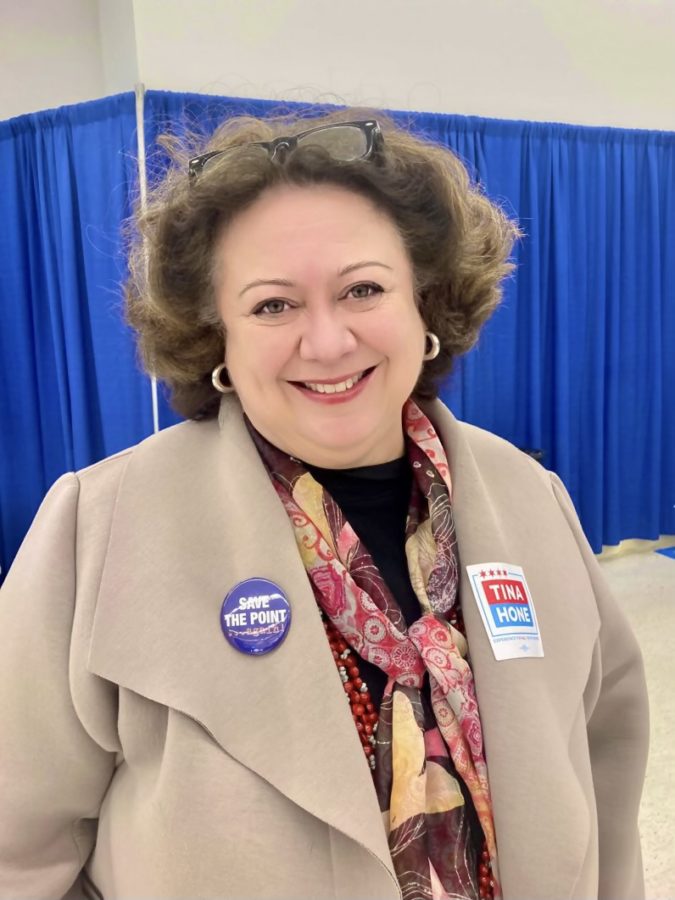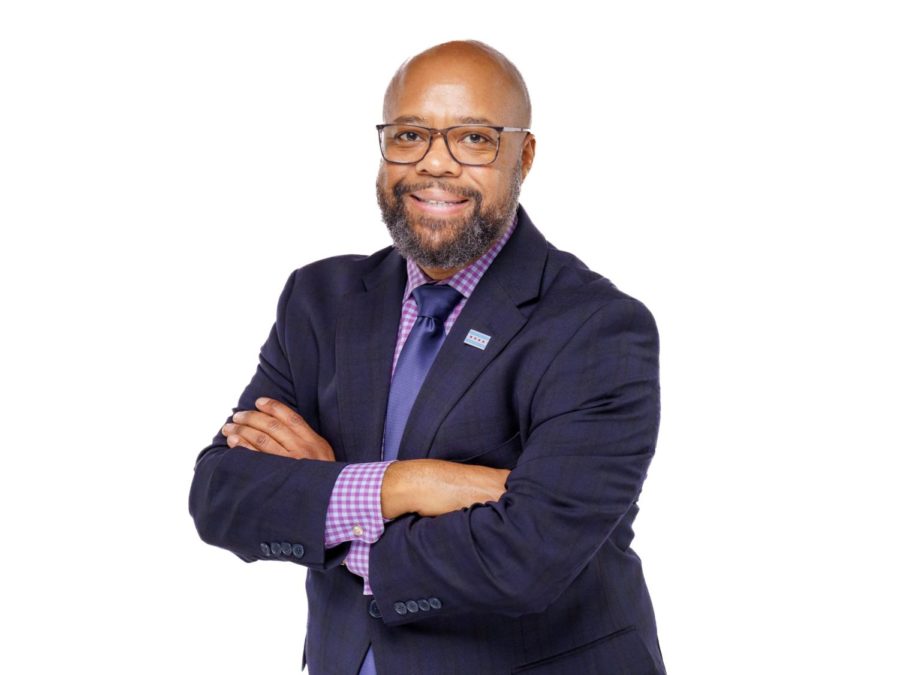Hone and Yancy Talk Housing, Safety, Residency Controversy Ahead of Fifth Ward Runoff
Tina Hone and Desmon Yancy sat down with The Maroon ahead of the runoff election for Fifth Ward alderman on April 4.
April 4, 2023
Today, April 4, 2023, voters in Hyde Park will choose whether Desmon Yancy or Tina Hone will replace six-term incumbent Leslie Hairston as Fifth Ward alderman. Yancy and Hone earned the most votes among the 11 candidates on the ballot in the first round of voting on February 28. Both of them sat down with The Maroon ahead of the runoff election to discuss their campaigns.
A complete list of voting sites open on April 4 can be found here.
Hone “Heartbroken by the Negativity of This Race”
Fifth Ward aldermanic candidate Tina Hone emphasized in-person canvassing and conversation in the last stretch ahead of the April 4 runoff elections. Hone will face community and labor organizer Desmon Yancy and is running to replace outgoing Fifth Ward alderman Leslie Hairston.
Hone, who graduated from the University of Chicago in 1984, most recently served as the City of Chicago’s chief engagement officer.
Yancy and Hone received 25.96 percent and 18.57 percent of the vote respectively in a crowded field of 11 candidates during the February 28 municipal election.
When asked how her policy positions have changed since the municipal election, Hone told The Maroon that “there has not been a dramatic shift, I believe, in my policy priorities.” Namely, Hone still emphasizes the need to increase public safety, invest in underserved youth, develop career pathways in high-demand industries, and create a safety net of affordable housing.
Nonetheless, Hone stresses that her policy positions are not fixed. Rather, they could fluctuate based on the conversations she has had with residents in the ward.
“I’m not a rigid person,” Hone said. “And so you may go out into the world thinking one thing, but as you listen to voters and listen to stakeholders, your positions may evolve a little bit.”
For example, Hone has yet to establish a firm stance on the plan to expand the Jackson Park golf course. The expansion would require hundreds of trees to be cut down on top of the hundreds already felled for the construction of the Obama Presidential Center (OPC), spurring several Chicago advocacy groups, such as Save Jackson Park, to rally against the golf course expansion.
“There are many people who have expressed concerns, and they’re legitimate concerns that I certainly understand and feel,” Hone said. “But as I have more conversations in South Shore, there’s a different feeling about the golf course. I’m finding people are more excited about the possibility of it. And so this will be one of those top issues of balancing competing legitimate interests that people who govern are called upon to do.”
Hone hopes to be more accessible to residents by returning their phone calls and emails more promptly than current alderman Hairston did.
“I think that on the campaign trail, what I’ve heard from many people is a disappointment about [Hairston’s] accessibility,” Hone said. “One of the things that’s really important to me is that people realize and understand that I know that I govern with the consent of the people and I serve them, not the other way around.”
Hone also plans to keep residents updated through newsletters and community meetings—something she believes has been lacking under Hairston’s tenure.
“I’ve been home for about six years in Hyde Park, and I am registered to vote here,” she said. “I have never gotten an invitation to a Fifth Ward meeting, and I’ve never gotten a newsletter or an email from my alderman. So I want to have better communication, broadly speaking, with my ward.”
In the final sprint before the runoffs, Hone’s campaign is focusing its energy on community engagement through conversations, both in-person and virtual. On February 28, Hone was spotted canvassing outside Ray Elementary School in the evening as voters came by.
“In-person engagement is very central,” Hone said. “Canvassing is part of it, but also lots of meet-and-greets and lots of Zoom calls and phone banking with buildings. One of the biggest challenges of this ward is accessing people in these buildings, so we’ve been focusing a lot on this mad dash on those big apartment buildings that we have not been able to door knock.”
Hone highlighted her financial constraints relative to Yancy’s when it comes to community outreach and organization. According to Reform for Illinois, a nonpartisan research and advocacy organization, Hone and Yancy currently have $69,446.45 and $316,277.48 in cash on hand for their campaigns.
“I’ll be honest, this has always been a very lean campaign,” she said. “I have not had the money that my opponent has raised. Last I looked, he had $288,000. I may be close to $100,000, so I don’t have the resources to have an office. My office is my dining room table.”
Hone also questioned the belief many in the community share that Yancy is the more progressive candidate of the two. She believes that his endorsements and financial backing from several key unions and Democratic state leadership make him the establishment candidate instead of a progressive one.
Yancy’s endorsements include unions like the Chicago Teachers Union (CTU), Service Employees International Union (SEIU) Healthcare, SEIU Local, and state politicians like Hairston, President of the Cook County Board of Commissioners Toni Preckwinkle, Cook County Assessor Fritz Kaegi, and Illinois senator Rob Peters.
“The party insiders or the party establishment are in lockstep behind him, and so I find it always fascinating that he’s considered the progressive candidate when I think independence is a key component of being progressive, and he’s certainly not the independent candidate that I am,” Hone said.
Hone further questioned Yancy’s residency, a controversy associated with his campaign since it began. Six fifth ward candidates, which does not include Hone, purchased advertisements prior to the municipal elections alleging that Yancy’s primary address is his former suburban South Holland home based on records that show he voted from that address in the 2020 March primary and general elections. Yancy told the Hyde Park Herald that he was not registered to vote in South Shore until March 2022 despite moving there four years prior.
“Either you lived in South Shore and voted improperly in South Holland, or you lived in South Holland and you didn’t meet the residency requirement to be running in the Fifth Ward,” Hone said. “I think that’s a legitimate question to be asked.”
Overall, Hone expressed that she was “heartbroken by the negativity of this race,” referring to personal attacks launched by both campaigns in the weeks leading up to the runoffs.
“I’m hoping these last few days, we will be able to focus on the positives that both Desmon and I bring to the table,” she said.
When asked what winning the aldermanic race would mean to her, Hone said, “It would be a capstone of my career. It would be an opportunity to give back everything I know and that I’ve learned over the course of my life and my career—to represent a ward that deserves to be fully represented so that it can achieve all of its aspirations. It will be represented like it has never been represented before if I win the seat, and I really want to give that to the people in the Fifth Ward.”
Yancy Touts “Better Understanding of the Issues” Facing Fifth Ward
Community and labor organizer Desmon Yancy is running to represent Chicago’s Fifth Ward in City Council in a runoff election to be held on April 4.
Yancy faces off against Martina “Tina” Hone in the runoff after he received 25.96 percent of the vote in the initial February 28 election, the most of any candidate. They are vying to replace outgoing alderman Leslie Hairston, who is retiring at the end of her term after 24 years in office. Hairston endorsed Yancy prior to the first round.
Yancy grew up in Calumet Heights, located south of the present Fifth Ward, and attended high school at Kenwood Academy, just north of the ward. On his way to school, Yancy passed through the different neighborhoods of the Fifth Ward, broadening his perspective.
“It took me straight down Jeffery [Boulevard] through South Shore, over to Woodlawn, and then through Hyde Park,” Yancy told The Maroon. “It was those experiences that helped shape the way that I view the state of politics today and my role in helping shepherd us through this moment that we’re in.”
Yancy spent more than a decade working at a number of Chicago-based advocacy groups and unions, including six years at SEIU Healthcare Illinois/Indiana as the lead organizer and director of leadership development.
Under former Illinois governor Bruce Rauner’s administration during the mid-2010s, social service agencies were under threat.
“He had a budget stronghold on the state, and social service agencies in neighborhoods were disappearing because they just didn’t have the funding to be able to provide those resources,” Yancy said. While protesting the situation, he was arrested.
Then in 2016, following the murder of Laquan McDonald by a Chicago police officer, Yancy had a “moment of reckoning.” Yancy, the son of a Chicago Police Department (CPD) officer who served for 40 years, co-founded the Grassroots Alliance for Police Accountability (GAPA) to push for the creation of a civilian oversight body for the CPD. The group successfully advocated for the passage of an ordinance in 2021 that established the Community Commission for Public Safety and Accountability, which oversees the new police district councils that featured on the February 28 ballot.
Yancy said his time working on the establishment of a police oversight board taught him about building community-based coalitions to enact policy goals and helped him build relationships that would be useful as an alderman.
“I’ve come to realize as we look at the moment we’re in this city and the type of change that we’re all seeking to create, it’s just going to be incumbent that we have elected leaders who have done the work of bringing people together, the hard world of coalition building,” he said.
Yancy touts his community-centric approach and lived experience as an advantage over Hone, who spent much of her political career in Washington, D.C.
“Chicago politics is a very, very different place,” Yancy said. “Having been in Chicago for the last 40 years—born here but spent the last 40 years continuously here in Chicago—I have a better understanding of the issues that exist in our communities.”
Yancy has faced questions from opponents over whether he actually resides in the ward. An advertisement purchased by a group of his opponents prior to the February 28 election alleged that Yancy’s primary residence was in South Holland, a suburb of Chicago. Yancy told the Hyde Park Herald that he was not registered to vote in South Shore until last March. After initially denying he had voted in either location, Yancy admitted he had voted in South Holland in 2020 but called it an “honest error.”
In response to the allegations, Yancy provided the Herald with a number of documents including medical bills, insurance claims, tax documents, and personal mail to show that he lived in the ward as early as 2019.
“Throughout this campaign, I’ve managed to maintain, despite being under attack, this even-keeled persona because this is who I am,” he told The Maroon. “Under pressure, it’s still about making sure that we achieve our goal. Though I’ve felt really uncomfortable at times, I was just focused on making sure that the residents of the Fifth Ward had an opportunity to learn about me and my platform.”
On public safety, Yancy said that rising crime rates despite consistent increases in police funding prove that Chicago’s policing system is outdated and its leadership reluctant to change. He is particularly concerned about long police response times.
“I talked with a resident who called the police a few weeks ago for an issue, and it took the police over two hours to get to their home,” Yancy said.
He advocates a shift to fighting the root causes of violence, which he identified as inadequate mental health care and youth support systems. In the short term, Yancy said his focus is on ensuring police resources are allocated efficiently and equitably rather than reducing the overall police presence.
“We have to make sure that, in our communities that are feeling the burden of crime and also the burden of over-policing, that the system is more adequate and provides relief for our residents.”
Central to Yancy’s platform is his belief that the ward’s affordable housing is adequate in supply but inadequate in quality. Many residents, particularly seniors, face repair costs they cannot afford, so Yancy hopes to expand upon existing pilot programs that provide assistance for residents to pay for maintenance in their homes.
Yancy said the relationship between the University of Chicago and its surrounding communities, often described as tense, was in an “evolutionary moment.” He pointed to the appointment of University President Paul Alivisatos and the hiring of former deputy governor Christian Mitchell as vice president for civic engagement as evidence for his statement.
“The University is willing to acknowledge that it’s time for a new way to engage the community as it grows its footprint and influence in the ward, and I’m grateful for that,” Yancy said.
If elected alderman, Yancy specifically hopes to collaborate with the University on creating a business incubator to use the University’s resources to support new commercial ventures in the area.
“When you look at all the schools at the University of Chicago, there’s just no lack of talent that exists in current students and alumni that can plug into all these sorts of things that we’re looking to create to build the community,” Yancy said.
When asked if he too would stay in office for more than two decades, as Hairston did, Yancy said “absolutely not.”
“One of the most important things I want to do is create a civic education platform that encourages young people to vote,” Yancy said, “so that when I leave office, there is a pipeline of engaged young people, and not-so-young people, here in the Fifth Ward who are willing to step in and lead the ward in the direction the community wants to go at that time.”


